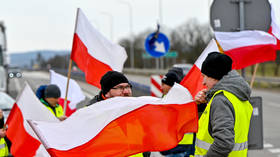Russia and Central Asian neighbors train to tackle Afghan threat
Russian President Dmitry Medvedev has attended the final stage of a large-scale joint military exercise being held by the Collective Security Treaty Organization (CSTO) at Matybulak range in southern Kazakhstan.
Along with the Russian president, the leaders of Kazakhstan, Kyrgyzstan, Tajikistan, Armenia and the Belarusian Defense Minister were in attendance to observe the games.
The Russian president has been impressed by the completed CSTO collective rapid response forces (KSOR) exercise and has called it the answer to the threats of terrorism, drug trafficking and religious extremism – something all the CSTO member countries are very well aware of.
“These drills mark a milestone for our cooperation within the CSTO,” Medvedev said. “This is a new step to create an effective backlash mechanism to the modern threats in Central Asia and other places, and it will enrich our cooperation potential.”
Medvedev said that the key to the success of the exercise was the fact that servicemen from different CSTO member countries have spent two months training together, which made it possible to get closer acquainted not only with each other, but also with methods and tactics of military forces of different countries.
Dmitry Medvedev reminded that the CSTO was created less than a year ago and that the necessary documents are not only signed and ratified, but also its military force has already been tested in the field. President Medvedev stressed that “this alliance was created in an unprecedented short time and that pace should be kept in the future.”
Collective forces in joint response games
The war games, called “Cooperation 2009,” started last Friday and involve over 7,000 troops, over 300 tanks and infantry combat vehicles and air force from Kazakhstan, Kyrgyzstan, Russia and Tajikistan. Belarus, Armenia and Uzbekistan were involved in earlier stages of the exercises, which tookplace at the joint CSTO command in Moscow and in Belarus.
The “Cooperation 2009” games have been aimed at practicing a joint response to crisis situations in the member states, particularly with respect to the deterioration of the situation in Afghanistan, which borders Tajikistan and Uzbekistan.
The CSTO member countries – Armenia, Belarus, Kazakhstan, Kyrgyzstan, Russia, Uzbekistan and Tajikistan – agreed to set up a joint rapid-reaction force in early February at a summit in Moscow.
Heads of the CSTO member states have arrived at the range dressed in the newly tailored uniforms specially developed for CSTO’s collective rapid response forces (KSOR).
During the military drill KSOR regiments from Kazakhstan and Armenia have disposed of an aggressive invading force.
KSOR forces from Russia and Kazakhstan have deployed via Il-76 airlifters and Mi-8 helicopters for blocking and eliminating a group of militants and hostage extraction. Live ammunition has been used during the exercise.
KSOR will be used for anti-terrorist operations, to fight drug trafficking and to deal with the effects of natural disasters.
But CSTO Secretary General Nikolay Bordyuzha said more effort is needed to insure security to the organization’s members.
The Collective Security Treaty Organization has to work toward setting up a large group of troops in Central Asia to rebuff a possible attack, Bordyuzha told the Kazakhstan Segodnya news agency.
“We've long been talking about the necessity to create a large group in the Central Asia region,” he said. “We have the collective rapid response forces (KSOR), and the collective rapid deployment forces (KSBR) there intended for containing local armed conflicts. But what if we have a full-blown war?”
“The KSOR and the KSBR can take part in large-scale military actions to protect the sovereignty of countries, but they cannot act as a decisive force,” Bordyuzha continued. “Therefore we say: We need a large group of troops, such as the Russian-Belarusian one, that comprises formations capable of rebuffing an attack.”
He doesn’t expect war on the territory of any of the CSTO states, but said that he’s concerned with the situation if Afghanistan.
“The situation in Afghanistan, which borders on the CSTO zone and members of our organization, is very acute and dangerous,” he said.
Read also Russia and India to develop supersonic missile invincible to interception











